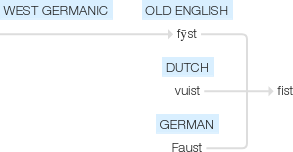Fist
Old English fȳst, of West Germanic origin; related to Dutch vuist and German Faust .
wiktionary
From Middle English fist, from Old English fȳst(“fist”), from Proto-West Germanic *fūsti, of uncertain origin. Cognate with Dutch vuist, German Faust. More at five.
From Middle English fisten, fiesten, from Old English *fistan("to break wind gently"; supported by Old English fisting(“breaking wind”)), from Proto-Germanic *fistaz(“breaking wind, fart”), from Proto-Germanic *fīsaną(“to break or discharge wind, fart”), from Proto-Indo-European *(s)peys-(“to blow, breathe”). Cognate with Dutch veest(“a fart”), Low German fīsten(“to break wind”), German Fist(“a quiet wind”), Fisten(“breaking wind”), Swedish fisa(“to fart”), Latin spīrō(“breathe, blow”), Albanian fryj(“to blow, breath”).
etymonline
fist (n.)
Old English fyst "fist, clenched hand," from West Germanic *fusti- (source also of Old Saxon fust, Old High German fust, Old Frisian fest, Middle Dutch vuust, Dutch vuist, German Faust), from Proto-Germanic *funhstiz, probably ultimately from a PIE "hand" word that is ultimately cognate with the root *penkwe- "five" (compare Old Church Slavonic pesti, Russian piasti "fist"), in reference to the five fingers.
Meaning "a blow with the fist" is from 1767. Fist-fight "duel with the fists" is from c. 1600. As a verb, Old English had fystlian "to strike with the fist."
